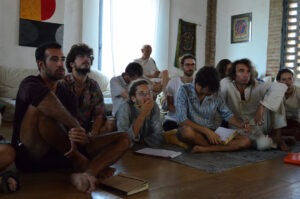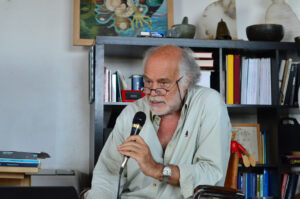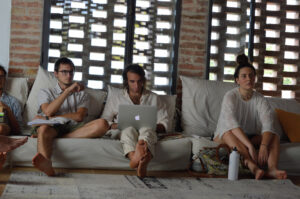
This course called “Bionoetics” is designed inter alia to show that Sheldon may have a point here (!);
https://www.youtube.com/watch?v=V_TQea0aOnE
 Seekers are looking for knowledge and understanding. The universities and other official academic institutions claim, with much justification, to be the providers and arbiters of knowledge. Yet academia is so full of trendiness and vicious competition that it often leaves alone the big, interesting questions, the ones that impelled Einstein to say that a human being who has lost the ability to wonder is already half-dead.
Seekers are looking for knowledge and understanding. The universities and other official academic institutions claim, with much justification, to be the providers and arbiters of knowledge. Yet academia is so full of trendiness and vicious competition that it often leaves alone the big, interesting questions, the ones that impelled Einstein to say that a human being who has lost the ability to wonder is already half-dead.
Several other problems confound the area of third-level scholarly activity – that is, learning, teaching and research, in that order of priority. Education is taking a backseat to research; the recent British Browne report envisages dropping the state’s subvention of teaching altogether. The emphasis on “research” at the expense of teaching has meant that even undergraduate programs are now very hard to assemble as each teacher insists on teaching her micro-specialization. Moreover, scholars who might usefully have learned a variety of different subjects have been forced into academic blind alleys in order to maintain funding for a lab.
Were the results of current trends obviously an increase in finding and disseminating truth, there might indeed be a strong argument for the status quo. Yet what really seems to have happened is, first of all, a notorious and sometimes literally fatal bias in the results of critical medical trials toward the corporate funders of those trials; less dangerously, a drive toward huge facilities like CERN that means cutting-edge experimental science can be performed only in a vanishingly small set of locales; finally, an exponential increase in the data collected, which are then processed by statisticians at a vast expertise remove from the experimentalists. Ironically, most of the cutting-edge findings are locked away from their public funders in highly profitable privately owned journals with an opaque review process.
The results of these trends are peculiar. One is a blatant denial of Rutherford’s dictum “If your experiment needs statistics, you ought to have done a better experiment.”. While it is not necessary to go as far as the Nobel laureate physicist, a recent – peer-reviewed and published – meta-analysis of fmri neuroscience “findings” showed that fully half of them clearly involved specious statistical reasoning. Moreover, it does seem to be the case that the emphasis on data-driven science has contributed to the current satisfaction with “darkness” – dark energy, dark matter, dark non-coding areas of the genome, all assumedly to be sorted out by further number-crunching instead of advancing to a new paradigm.
Einstein’s childlike sense of wonder is surely a precondition for physics, and as such a basis for all the sciences. Likewise, those in biology should feel that their engagement with their discipline has emerged from a reverence for life; those in the informational sciences like computing should insist on an insatiable curiosity; those in the social sciences should feel that their goal is ultimately understanding their apparent innermost urges to be often an almost mechanical result of forces within their societies.
Why Bionoetics?
 · The convergence occurring between science, particularly physics, and ancient teachings abut creation from a point, the fact that the cosmos seems to show design in “fine tuning” and much else, invites the prospect of integrating science and religion in one “Magisterium”. With that enters the possibility of taking on board the higher achievements of the arts and humanities, which – all together- is the content of this course.
· The convergence occurring between science, particularly physics, and ancient teachings abut creation from a point, the fact that the cosmos seems to show design in “fine tuning” and much else, invites the prospect of integrating science and religion in one “Magisterium”. With that enters the possibility of taking on board the higher achievements of the arts and humanities, which – all together- is the content of this course.
· True knowledge is objective, at least in the sense of being consensual to the point of being “exigent”, to compelling the knower to accommodate it. In any case, the raw expression of such knowledge – be it mathematical, moral, or spiritual – is psychologically prior to its explanation in terms of the mental operations required to understand it. Indeed, in the case of quantum mechanics and other such disciplines, it seems to be the case that our cognition cannot encompass the valid operations by which undoubtedly true knowledge is generated. Thus, the category of the “noetic” is introduced to propose a category of knowledge higher than the “cognitive”, which is expressed in terms of transparent mental operations.
· As a cognitive scientist the writer is aware of the radical nature of this move. The new term “Bionoetics”, coined by the author in 2007, is the study of how we biological creatures yet have access to objective knowledge. Bionoetics extends the analysis already undertaken by those who study codes in biology, and has its own vocabulary with which the natural world is parsed.
· The view that stresses a teleology in nature, and that attempts to describe all its phenomena with this theme in mind, does not conflict with best practice in science; in fact, particularly in biology, it results in a sense-giving explanatory framework and informative, testable hypotheses
· The most elliptical, economical and veridical description of the physical world in mathematics. The most elliptical, economical and veridical description of the mind is cognitive science, with its vocabulary of schemes, recursion, symbols and so on. The most elliptical, economical and veridical description of our being-in-the world is the concepts of intention, freedom, joy, and self-transcendence; in short, folk psychology.
· There is a level of description of every area of human activity that is logically and psychologically prior to how that description is processed. So we have an area called “physics” and also an area called “politics”. To eschew participation in the political sphere as an activity toward the betterment of man is itself a political decision; our age is full of backdoors to achieve this end while pretending one has not done so.
This course is oriented toward graduates from degrees who have felt certain burning questions in themselves remain unanswered by their studies at a conventional institute. Let us look first at a few such from some of the sciences;
PHYSICS
Do the Copenhagen and ontological interpretations of wave-function breakdown reflect different psychological dispositions, or are they in principle formally distinguishable?
Why is there so little progress to a grand unified theory that string theory is starting to be derided?
Is there really an external ordering process in the cosmos, one labelled “God” by proponents of intelligent design?
What have the chaoplexity sciences actually wrought?
Can information really be lost in black holes?
BIOLOGY
Why was Darwinian evolutionary theory accepted even before there was a plausible theory of genetics, and is this premature acceptance underlying the intelligent design debate?
Does the very limited success of the human genome project imply that we need a new theory of symbol systems in nature, encompassing gene expression all the way to natural language?
What is the relationship between diet, metabolism, thermodynamics, and biochemical pathway?
THE INFORMATIONAL SCIENCES
Why cannot we parse any complete natural language after a half-century of trying?
Will quantum computing change our notion of computability?
How far can the notion of information be extended as an explanatory tool, or, as in the case of Murray Gell-Mann, a moral imperative?
PSYCHOLOGY
Is consciousness best regarded as a property of the cosmos, or an epiphenomenon of mental processing?
Does this also go for emotion?
Is there any physiological basis for meditation?
Are there formal limits to any attempted scientific formalization of mind and/or if such a formalization was achieved, would anyone even understand it? Many math theorems are now too complicated to be checked by a person.
SOCIAL SCIENCES
Is there a real progression evident from feudalism to democratic republics?
Is a caliphate-type theocracy desirable, given its undoubted capacity to give stability?
What is the relationship between science, society, and religion that best does justice to all?
Are there objective rules in art, or is it all personal preference?

It is our, hopefully uncontroversial, contention that most of education involves students and teacher reading, discussing, and trying to improve their powers of concentration. If there is indeed some direct connection with the soul of the cosmos that can be achieved by arational initiation – and we have not found any such – the facts remain untouched by it. What we offer, on the contrary, is a set of lectures and discussions that penetrate right to the heart of cutting-edge science and arts in a variety of fields. Open-source material will be used.
PHYSICS
As in the other courses, students who have not included physics in their bachelor’s should take a standard curriculum also;
For example, classical physics including cosmology ;
http://www.youtube.com/watch?v=32wIKaLkvc4
Quantum physics;
http://www.youtube.com/watch?v=0Eeuqh9QfNI&feature=channel
Cosmology; the “big bang” and its conceptual origins.
The origins of order; the anthropic principle and our privileged place in the unfolding of the cosmos
From Gaililean mechanics through QM and relativity to the search for a grand unified theory
Chaoplexity; what is chaos? What are non-linear effects? Why is this field so important?
 Mathematical physics; why this “unreasonable effectiveness of mathematics in the natural sciences”? Alternatively put; why math’s unreasonable ineffectiveness in the case, say, of string theory, which has failed to produce a single tested hypothesis for all its mathematical virtuosity and undoubted explanatory promise? Is math constructed by us, or invented by us – or should the apparent dichotomy itself be a focus of investigation?
Mathematical physics; why this “unreasonable effectiveness of mathematics in the natural sciences”? Alternatively put; why math’s unreasonable ineffectiveness in the case, say, of string theory, which has failed to produce a single tested hypothesis for all its mathematical virtuosity and undoubted explanatory promise? Is math constructed by us, or invented by us – or should the apparent dichotomy itself be a focus of investigation?
BIOLOGY
Again, given how well-established are many of the findings of this field, a standard university course is recommended for students who have not included biology in their bachelor’s, for example;
http://www.youtube.com/watch?v=lm8ywGl9AIQ&feature=channel
http://www.youtube.com/watch?v=_m4Gvu90Ydw
http://ocw.mit.edu/courses/biology/7-012-introduction-to-biology-fall-2004/
Health; diet, ageing, exercise, and the limits of the biomedical model.
What is cancer?
The contrast between metabolism and codes; genetic, histone, and other codes
Syntax as an essential part of nature; viruses and other text-editors
Epigenetics; factors that structure the unfolding of the genome in time and space, and the consequences for the nature/nurture debate
SOCIAL SCIENCES
The origins of the normative ie rule-based, in human experience
The role of religion in pre-industrial society and the necessity for outsourcing its concerns to other societal structures.
What then is left for religion? – Krishnamurti/Maharshi, Gurdjieff, MLK/Gandhi.
The dangers of fundamentalism
Liberal republican democracy; the individual as microcosm in a self-similar structure
Open source; the Luddites being creative, rather than destructive, this time
PSYCHOLOGY/AESTHETICS
The classical domain of psychology; methodology and conclusions. The relationship with art, with its much wider vocabulary – if even more intangible denotation for its creations – than science.
A greater psychology; consciousness and the self
Aesthetics; formal complexity, expression and suppression of desire, and self-awareness
Music; Indian rags and other modal musics; the classical period of western music; what next, after jazz?
Art; why did painting lag behind architecture? After post-impressionism and cubism, what next?
Transcending postmodernism
ETHICAL ISSUES; PHILOSOPHY AND SOCIOLOGY OF SCIENCE
Philosophy of Science; from verificationism to Popper’s falsification to Kuhn’s protean notion of the “paradigm”
Ironic science; Stent and the Cern project. Feyerabend; Laudan.
Green chemistry; how to begin testing the 95% of artificial chemicals in our environment that have not yet been tested for carcinogenic and other effects
Nanotechnology; is this quick-fix approach really likely to solve previously intractable medical and environmental issues? Where is its advantage over conventional applied physical chemistry?
Neuroscience; Given the rampant fraud in this area recently exposed by Vul et al, is there a case for giving higher primates, including coerced humans, a break from invasive experimentation?
The research university; Given that this concept immediately denigrates those who like and are good at undergraduate teaching, should the state subsidize it to the current extravagant extent?
The web and the search for truth; is anonymous reviewing in high-price journals, inaccessible to the taxpayer who foots the bill, really the best way to find and disseminate truth?
This section concludes with first a categorized then uncategorized list of useful open science sites.
There is a fair amount of duplication
As one is obliged to say, have fun!

http://creativecommons.org/science Perhaps a little disappointing given the cc hype
http://www.openinventionnetwork.com/ – good link to patent attacks
http://daviswiki.org/LUGOD Linux/Gnu fans
http://keionline.org/ “Knowlege ecology” Good, informative
http://apply.fundscience.org/about.html small projects a bit suspect
http://sciflies.org/project_list.php?view=all small projects a bit suspect but less so
http://www.righttoresearch.org/ for students and very good
http://thirdreviewer.com/ general comments
http://roar.eprints.org/ is reprints free
http://www.eprints.org/openaccess/ similar – Stevan Harnad, who pioneered “skywriting” is here!
http://foresight.org/ as it says on frontier tech with example http://opensourcesensing.org/
http://speakscience.org/ better still includes videos
http://okfn.org/ good = open knowledge, has tools
http://okfn.org/okcon/2010/ open nlj conferences some ste
http://www.biotorrents.net/browse.php loads of data incl astrophysics
http://www.mendeley.com/ soc netw for sci w tools
http://colabscience.com/ collaborations parallel scientific
http://corp.kaltura.com/ video
Biology and Biomedical Applications
http://p2pfoundation.net/Product_Hacking Hardware and has real sites as links
http://blog.stodden.net/A pioneer speaks
http://www.mindthehealthgap.org/ great idea neglected diseases
http://openpcr.org/ Good PCR tools
http://www.synthesis.cc/ a bit dangerous and very good indeed – rob carlson
http://www.yale.edu/macmillan/igh/ seems “open source” pharma?
http://www.sagebase.org/ well worked out organization for biomed apps
http://www.collaborativedrug.com/ well worked out good idea
http://www.pipra.org/ energy as well as biomed help – – cool
http://pinkarmy.org/ breast cancer etc – good and important
http://diybio.org/ what it says – is a bit suspect
http://exponentialbiosciences.com/ suspect
http://www.pearlbiotech.com/buy/ real
http://www.polonator.org/ open sequencing
Cog Sci/Neuroscience
http://thirdreviewer.com/neuroscience/ comments
http://opensourcecognitivescience.wordpress.com/ gone-ish
The following are all pretty good in this category;
ScienceBlogs : Brain & Behavior
Chemistry
http://www.chemhacker.com/ pretty real
OPEN SCIENCE SITES; GENERAL RESOURCES
PLoS ONE : Publishing science, accelerating research
ScienceBlogs : Brain & Behavior
Skeptic: Home: The Skeptics Society & Skeptic magazine
TOOLKITS
Welcome to the OpenEEG project
Connotea: free online reference management for clinicians and scientists
Reference SNP(refSNP) Cluster Report: rs41279541
More resources
http://en.wikipedia.org/wiki/Open_peer_review
http://www.theopensourcescienceproject.com/
http://www.mindthehealthgap.org/
http://www.biotorrents.net/browse.php
http://thirdreviewer.com/neuroscience/
http://p2pfoundation.net/Product_Hacking
http://www.righttoresearch.org/
http://www.eprints.org/openaccess/
http://sciflies.org/project_list.php?view=all
http://www.pearlbiotech.com/buy/
http://www.yale.edu/macmillan/igh/
http://www.collaborativedrug.com/
http://www.openinventionnetwork.com/
http://www.press.uchicago.edu/presssite/metadata.epl?isbn=9780226028552

We have reached a Kuhnian “crisis” in several disciplines, if current discourse is anything to go by. The visible universe is now said to contain only 5% of the total mass/energy; the rest is “dark”, of a type we do not know. Quantum Mechanics(QM) remains as incomprehensible as ever, and the ether is making a sneaky comeback. Even the HGP head Francis Collins now talks about the “dark” non-coding areas of the genome, as distinct from the 1.5% implicated in coding proteins. Neuroscience has followed the trend in speaking about the “dark energy” of the brain which absorbs at least 18% of the organism’s metabolism.
Unfortunately, the very disciplines that should be providing a sense-giving commentary have lapsed into faddism; in particular, those who claim to study “science and society” in general think that they can remain innocent of science. The Sokal incident, wherein a parody paper on QM was accepted in “Social text”, is only the tip of the iceberg; the list of gobbledygook providers from France alone would include the herculean obscurantism of Kristeva, Derrida, Foucault; what those of us in the Anglo-Saxon world often miss is that they are all highly privileged civil servants, in a state where riots break out if they are asked to “work” to 62.
Science is funded in a manner guaranteed to preserve outdated paradigms, and to foster corruption. The shock evinced by the climate “researchers” at East Anglia for criminal activity that would have ensured a prosecution in any other field was because what they did was simply academic business as usual; massaging of data, marginalization of intellectual opponents, and “professional” relationships that resembled criminal conspiracy.
So what can be done? It is in fact very easy to resolve all these issues;
1.Set up a set of open-source journals
2.Do not allow reviewers to remain anonymous. In fact, insist that the reviews and the reviewers’ names be put on the website.
3.Allow an open discussion to begin. As it continues, reputation will be established in an organic and true way
At a guess, this would cost about 0.01% of the budget of national science funding agencies like SFI, and produce better science.
